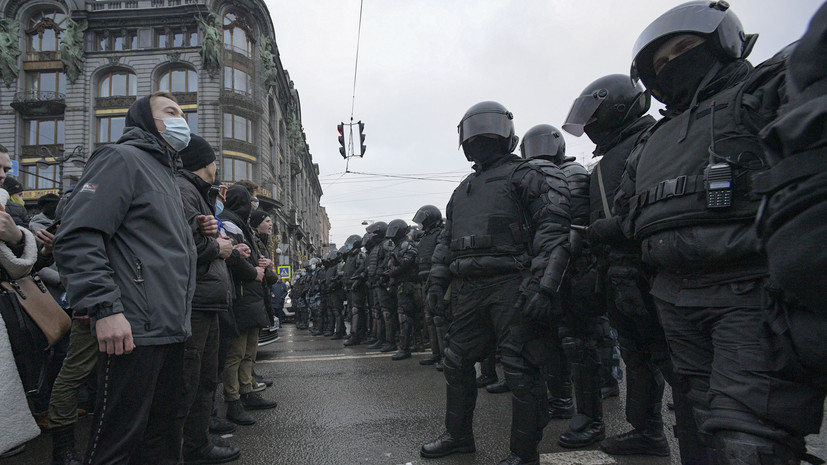The Russian Ministry of Internal Affairs warned of criminal and administrative responsibility for participating in illegal protest actions.
The relevant messages were published on Twitter by the department.
The ministry drew attention to the fact that for organizing mass riots accompanied by violence, pogroms, arson, destruction of property, the use of weapons, as well as providing armed resistance to a representative of the authorities, the Criminal Code provides for imprisonment for a period of 8 to 15 years.
Participation in such riots is punishable by imprisonment for a term of 3 to 8 years.
In addition, participation in unauthorized public events that interferes with the functioning of life support facilities, transport or social infrastructure may result in administrative arrest for up to 15 days.
The same measure is provided for the involvement of a minor in participation in an unauthorized rally in the event, and for a repeated violation, 30 days of arrest are threatened.
At the same time, the official representative of the department, Irina Volk, said that the Ministry of Internal Affairs has information about the calls of the organizers of illegal actions to aggressive behavior.
“The territorial bodies of the Ministry of Internal Affairs of Russia are receiving information that the organizers of unauthorized public events in the constituent entities of the Russian Federation, scheduled for January 31, are calling on their supporters to behave aggressively against law enforcement officers who ensure public order.
The aim of the provocateurs is to initiate clashes between the protesters and representatives of the law enforcement agencies, ”she warned.
The department warned that any violent actions against police officers would be suppressed, called on Russians to refrain from participating in such events, and also reminded that restrictions imposed by the threat of the spread of coronavirus continue to apply in the regions of the country.
"In this regard, calls for unauthorized actions and participation in them are violations of the law and entail administrative and, in some cases, criminal liability," Volk quoted TASS as saying.
To gallery page
In turn, the press service of the Ministry of Internal Affairs in the capital announced the closure of several metro stations and restrictions on the movement of pedestrians in the center of the capital on January 31.
“From 08:00 am, Moscow metro stations will be closed at the entrance and exit: Aleksandrovsky Sad, Okhotny Ryad, Teatralnaya, Revolution Square, Kuznetsky Most, Lubyanka, Kitai-Gorod.
All restrictions will be in effect until a special order from the police, ”the message says.
Also, the head of the department of trade and services, Aleksey Nemeryuk, said that some shops and cafes, as well as trade enterprises, will be closed in the center of Moscow on Sunday.
“In addition, the sale of alcohol will be limited in the city center from 9:00 to 23:00," Nemeryuk said.
In particular, the sale of alcoholic beverages in glass containers will be prohibited on Krasnaya, Manezhnaya and Lubyanskaya squares, on Bolshaya Dmitrovskaya, Tverskaya, Pokrovka, Okhotny Ryad and other central streets.
The Prosecutor General's Office also reminded of the responsibility for participation in illegal rallies.
The department, in particular, submitted requirements to Roskomnadzor to restrict access to illegal information on websites and in social networks.
"Persons calling for illegal actions have been warned about the inadmissibility of violating the law," the Prosecutor General's Office reported.
Recall that after the unauthorized actions that took place on January 23 in a number of Russian regions, the Investigative Committee opened more than 20 criminal cases, including on the involvement of children in illegal events and calls for riots on social networks.
Cases were also opened on the facts of attacks on law enforcement officers, hooliganism, damage to property.
Supporters of blogger Alexei Navalny, who returned to Russia from Germany on January 17, where he was undergoing treatment, and was detained at Sheremetyevo airport, called for protests.
The FSIN said that the reason for the detention was Navalny's repeated violations of the probationary period assigned to him in the case of embezzlement of funds from the Yves Rocher company.
In this regard, on January 18, the Khimki city court imprisoned Navalny for 30 days.
The blogger and his supporters began to circulate statements calling for participation in illegal rallies in support of him, using social networks popular among teenagers.
Presidential press secretary Dmitry Peskov drew attention to the fact that "there are certain provocateurs who are calling" for this action, their actions are well understood both in the Kremlin and law enforcement agencies.
It is worth noting that on January 22, the US Embassy in Moscow posted a "demonstration warning" on its website, which indicated the locations, gathering times and plans of participants in unauthorized actions.
The Russian Foreign Ministry accused the diplomatic mission of disregarding diplomatic norms, and recommended that the United States authorities pay attention to their own problems.
“In essence, we are talking about encouraging violent actions, hypocritically declared as a peaceful protest, in which the organizers cynically involve even minors,” the ministry said.

